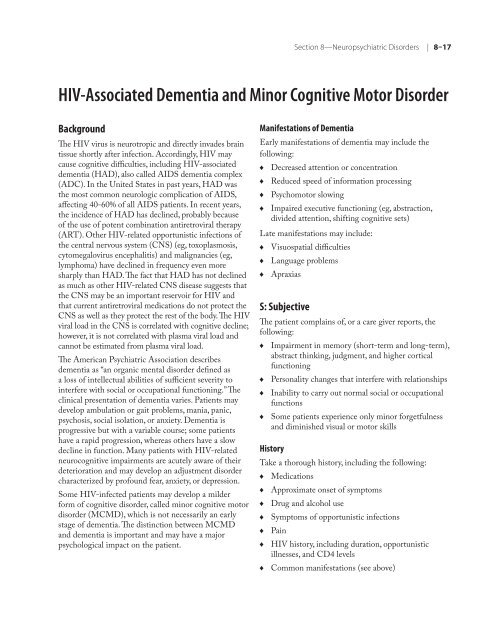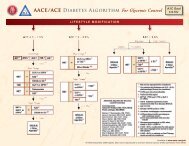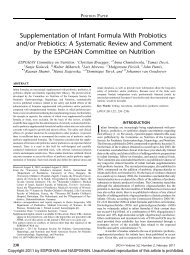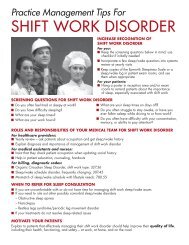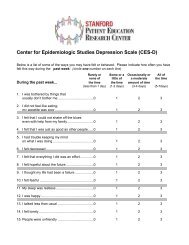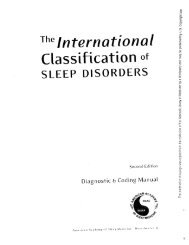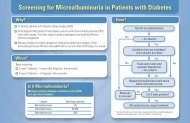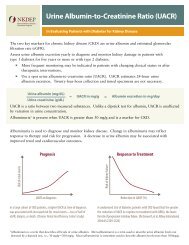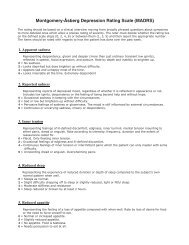Clinical Manual for Management of the HIV-Infected ... - myCME.com
Clinical Manual for Management of the HIV-Infected ... - myCME.com
Clinical Manual for Management of the HIV-Infected ... - myCME.com
Create successful ePaper yourself
Turn your PDF publications into a flip-book with our unique Google optimized e-Paper software.
Section 8—Neuropsychiatric Disorders | 8–17<br />
<strong>HIV</strong>-Associated Dementia and Minor Cognitive Motor Disorder<br />
Background<br />
The <strong>HIV</strong> virus is neurotropic and directly invades brain<br />
tissue shortly after infection. Accordingly, <strong>HIV</strong> may<br />
cause cognitive difficulties, including <strong>HIV</strong>-associated<br />
dementia (HAD), also called AIDS dementia <strong>com</strong>plex<br />
(ADC). In <strong>the</strong> United States in past years, HAD was<br />
<strong>the</strong> most <strong>com</strong>mon neurologic <strong>com</strong>plication <strong>of</strong> AIDS,<br />
affecting 40-60% <strong>of</strong> all AIDS patients. In recent years,<br />
<strong>the</strong> incidence <strong>of</strong> HAD has declined, probably because<br />
<strong>of</strong> <strong>the</strong> use <strong>of</strong> potent <strong>com</strong>bination antiretroviral <strong>the</strong>rapy<br />
(ART). O<strong>the</strong>r <strong>HIV</strong>-related opportunistic infections <strong>of</strong><br />
<strong>the</strong> central nervous system (CNS) (eg, toxoplasmosis,<br />
cytomegalovirus encephalitis) and malignancies (eg,<br />
lymphoma) have declined in frequency even more<br />
sharply than HAD. The fact that HAD has not declined<br />
as much as o<strong>the</strong>r <strong>HIV</strong>-related CNS disease suggests that<br />
<strong>the</strong> CNS may be an important reservoir <strong>for</strong> <strong>HIV</strong> and<br />
that current antiretroviral medications do not protect <strong>the</strong><br />
CNS as well as <strong>the</strong>y protect <strong>the</strong> rest <strong>of</strong> <strong>the</strong> body. The <strong>HIV</strong><br />
viral load in <strong>the</strong> CNS is correlated with cognitive decline;<br />
however, it is not correlated with plasma viral load and<br />
cannot be estimated from plasma viral load.<br />
The American Psychiatric Association describes<br />
dementia as “an organic mental disorder defined as<br />
a loss <strong>of</strong> intellectual abilities <strong>of</strong> sufficient severity to<br />
interfere with social or occupational functioning.” The<br />
clinical presentation <strong>of</strong> dementia varies. Patients may<br />
develop ambulation or gait problems, mania, panic,<br />
psychosis, social isolation, or anxiety. Dementia is<br />
progressive but with a variable course; some patients<br />
have a rapid progression, whereas o<strong>the</strong>rs have a slow<br />
decline in function. Many patients with <strong>HIV</strong>-related<br />
neurocognitive impairments are acutely aware <strong>of</strong> <strong>the</strong>ir<br />
deterioration and may develop an adjustment disorder<br />
characterized by pr<strong>of</strong>ound fear, anxiety, or depression.<br />
Some <strong>HIV</strong>-infected patients may develop a milder<br />
<strong>for</strong>m <strong>of</strong> cognitive disorder, called minor cognitive motor<br />
disorder (MCMD), which is not necessarily an early<br />
stage <strong>of</strong> dementia. The distinction between MCMD<br />
and dementia is important and may have a major<br />
psychological impact on <strong>the</strong> patient.<br />
Manifestations <strong>of</strong> Dementia<br />
Early manifestations <strong>of</strong> dementia may include <strong>the</strong><br />
following:<br />
♦<br />
♦<br />
♦<br />
♦<br />
Decreased attention or concentration<br />
Reduced speed <strong>of</strong> in<strong>for</strong>mation processing<br />
Psychomotor slowing<br />
Impaired executive functioning (eg, abstraction,<br />
divided attention, shifting cognitive sets)<br />
Late manifestations may include:<br />
♦<br />
♦<br />
♦<br />
Visuospatial difficulties<br />
Language problems<br />
Apraxias<br />
S: Subjective<br />
The patient <strong>com</strong>plains <strong>of</strong>, or a care giver reports, <strong>the</strong><br />
following:<br />
♦<br />
♦<br />
♦<br />
♦<br />
Impairment in memory (short-term and long-term),<br />
abstract thinking, judgment, and higher cortical<br />
functioning<br />
Personality changes that interfere with relationships<br />
Inability to carry out normal social or occupational<br />
functions<br />
Some patients experience only minor <strong>for</strong>getfulness<br />
and diminished visual or motor skills<br />
History<br />
Take a thorough history, including <strong>the</strong> following:<br />
♦<br />
♦<br />
♦<br />
♦<br />
♦<br />
♦<br />
♦<br />
Medications<br />
Approximate onset <strong>of</strong> symptoms<br />
Drug and alcohol use<br />
Symptoms <strong>of</strong> opportunistic infections<br />
Pain<br />
<strong>HIV</strong> history, including duration, opportunistic<br />
illnesses, and CD4 levels<br />
Common manifestations (see above)


